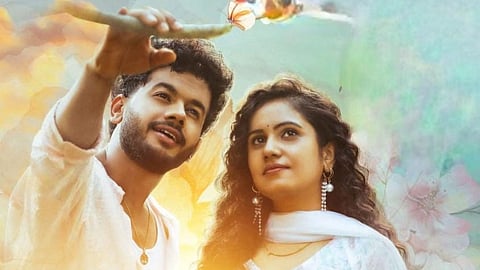Love U Muddu Movie Review: A gentle celebration of real-life romance
Love U Muddu Movie Review(3 / 5)
Love U Muddu Movie Review:
In Love U Muddu, director Kumaar goes beyond the typical romantic drama to create something deeply human. Based on the true story of Akash Narayankar and Anjali Bhai Shinde that shook Solapur, the film focusses on two ordinary people who turned love into something unbreakable. The filmmaker’s choice to retell their story feels both personal and respectful, though he does take some creative liberties.
Siddu and Reshmaa step into the lives of this real couple with an ease that feels natural. Their performances are filled with pauses and hesitations instead of polished lines. Siddu plays Karna, a privileged young man who chooses to be a photojournalist. His life unfolds behind the camera, where he looks for stories that matter. On his late mother’s birthday, he drives to Karkala, hoping the road will bring him closer to her memory. He is joined by Dinesh (Shyam Srivatsan), a friend who wants to be a popular influencer and adds humour to Karna’s road journey.
Director: Kumaar
Cast: Siddu, Reshmaa, Rajesh Nataranga, Tabla Nani, Shyam Srvatsa, and Girish Shivanna
That trip changes everything. While capturing nature and people through his lens, Karna meets Sumathi, a schoolteacher with a reserved smile. Their first interaction is awkward, stemming from a misunderstanding that slowly develops into unspoken affection. Kumaar doesn’t turn their love into a spectacle. It starts almost invisibly through small glances, shared silences, and the recognition of loneliness in each other’s eyes.
The film’s emotional shift comes unexpectedly. Karna shares a close bond with his father, played by Rajesh Nataranga, whose quiet warmth adds depth to the story. When a sudden accident puts Sumathi’s life on hold, Karna faces a difficult question: can love exist without a response? What follows isn’t melodrama but quiet perseverance. Karna stays by her side, his conversations reduced to whispers and his hope carried in repetition.
Siddu’s portrayal avoids seeking sympathy. His strength comes from his stillness, and his grief feels like devotion.
Reshmaa’s performance gains strength from minimalism. Even when her character stops speaking, her presence continues to guide the film. Together, they create moments that feel borrowed from real life. Rajesh Nataranga, as the father, brings a gentle and understanding presence, while Tabla Nani, Srivatsa Shyam, and Girish Shivanna keep the story grounded. Every supporting character adds warmth without overwhelming the intimacy of the central story.
Love U Muddu has a quiet visual grace, courtesy cinematographer Krishna Deepak, who captures the greenery, the coastal line, and the dim corridors of hospitals with sensitivity. Aniruddha Sastry’s music and especially the songs carry emotion without being overpowering, and CS Deepu’s editing allows the story to flow naturally.
The film's weaker parts lie in its lighter moments. The early comedy and side tracks feel disconnected from the main plot. However, when the story returns to Karna and Sumathi, the emotional weight brings everything back into focus.
Kumaar, known for Chemistry of Kariyappa and Critical Keerthanegalu, shows his most restrained direction yet. He seems aware that this story belongs to real people and handles it with care, avoiding sentimentality. He keeps the couple’s life grounded in reality, though he sometimes takes liberties that seem unnecessary. A few scenes feel out of place, but overall, he moves with purpose to do justice to a story that truly needed to be told.
The final scene acts like an emotional mirror. As the real faces of Akash and Anjali appear on screen, fiction fades away. Their laughter and truth give the film a lasting impact.
Love U Muddu isn’t just about how two people fall in love. It explores endurance, quiet strength, and faith that survives without reward.
In an age that celebrates digital affection, Kumaar’s film serves as a reminder of something the world often forgets. Love is not the start of a story; it is what remains when the story ends.

